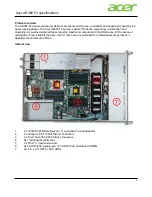
UMN:CLI
User Manual
V8102
162
7.3
Remote Monitoring (RMON)
Remote Monitoring (RMON) is a function to monitor communication status of devices
connected to Ethernet at remote place. While SNMP can give information only about the
device mounting an SNMP agent, RMON gives network status information about overall
segments including devices. Thus, user can manage network more effectively. For in-
stance, in case of SNMP it is possible to be informed traffic about certain ports but
through RMON you can monitor traffics occurred in overall network, traffics of each host
connected to segment, and the current status of traffic between hosts.
Since RMON processes quite lots of data, its processor share is very high. Therefore,
administrator should take intensive care to prevent performance degradation and not to
overload network transmission caused by RMON. There are nine RMON MIB groups de-
fined in RFC 1757: Statistics, History, Alarm, Host, Host Top N, Matrix, Filter, Packet Cap-
ture and Event. The V8102 supports two MIB groups of them, most basic ones: Statistics
(only for uplink ports) and History.
7.3.1
RMON History
RMON history is periodical sample inquiry of statistical data about each traffic occurred in
Ethernet port. Statistical data of all ports are pre-configured to be monitored at 30-minute
interval, and 50 statistical data stored in one port. It also allows you to configure the time
interval to take the sample and the number of samples you want to save.
To open
RMON Configuration
mode, use the following command.
Command
Mode
Description
rmon-history
<1-65535>
Global
Opens
RMON Configuration
mode.
1-65535: index number
The following is an example of opening
RMON Configuration
mode with index number 5.
SWITCH(config)#
rmon-history
5
SWITCH(config-rmonhistory[5])#
Input a question mark <
?
> at the system prompt in
RMON Configuration
mode if you
want to list available commands.
The following is an example of listing available commands in
RMON Configuration
mode.
SWITCH(config-rmonhistory[5])#
?
RMON history configuration commands:
active
Activate the history
data-source
Set data source name for the ethernet port
do
To run exec commands in config mode
exit
End current mode and down to previous mode
help
Description of the interactive help system
interval
Define the time interval for the history
owner
Assign the owner who define and is using the history
resources
requested-buckets
Define the bucket count for the interval
show
Show running system information
















































